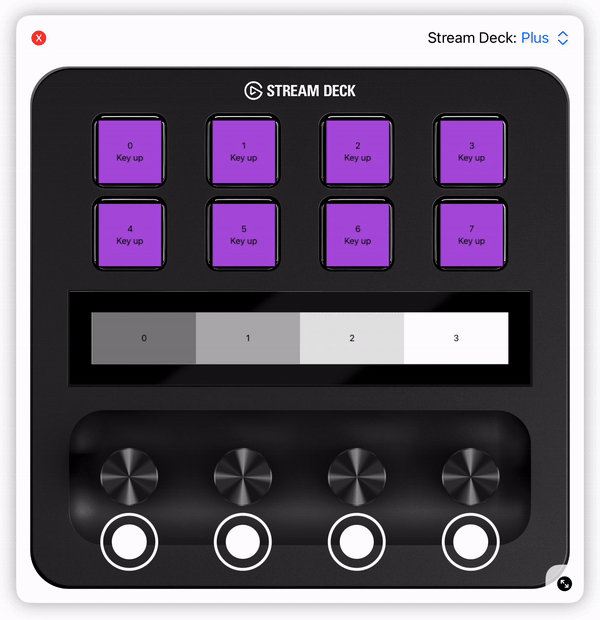Handling State Changes
As described in the layout system, the StreamDeckLayout combined with the @StreamDeckView Macro does the heavy lifting for you by automatically recognizing view updates, and triggering an update of the rendered image on your Stream Deck device.
To update your StreamDeckLayout on events like key presses or dial rotations, the view that should react to state changes needs to be extracted in its own view, just as you would normally do with SwiftUI. If that view is annotated with the @StreamDeckView Macro, context-dependent variables like the viewIndex and viewSize are available in that view's scope.
Example
Here's an example of how to create a basic stateful StreamDeckLayout which changes the appearance on events like key presses or dial rotations.
For Stream Deck +, this layout will be rendered and react to interactions as follows:

import StreamDeckKit
import SwiftUI
@StreamDeckView
struct StatefulStreamDeckLayout {
var streamDeckBody: some View {
StreamDeckLayout {
StreamDeckKeyAreaLayout { _ in
// To react to state changes within each StreamDeckKeyView, extract the view, just as you normally would in SwiftUI
// Example:
MyKeyView()
}
} windowArea: {
// To react to state changes within each view, extract the view, just as you normally would in SwiftUI
// Example:
if streamDeck.info.product == .plus {
StreamDeckDialAreaLayout { _ in
MyDialView()
}
} else if streamDeck.info.product == .neo {
MyNeoPanelView()
}
}
}
@StreamDeckView
struct MyKeyView {
@State private var isPressed: Bool = false
var streamDeckBody: some View {
StreamDeckKeyView { pressed in
self.isPressed = pressed
} content: {
VStack {
Text("\(viewIndex)") // `viewIndex` is provided by the `@StreamDeckView` macro
Text(isPressed ? "Key down" : "Key up")
}
.frame(maxWidth: .infinity, maxHeight: .infinity)
.background(isPressed ? .purple.opacity(0.5) : .purple) // Updating the background depending on the state
}
}
}
@StreamDeckView
struct MyDialView {
@State private var offset: CGSize = .zero
@State private var scale: CGFloat = 1
var streamDeckBody: some View {
StreamDeckDialView { rotations in
self.scale = min(max(scale + CGFloat(rotations) / 10, 0.5), 5)
} press: { pressed in
if pressed {
self.scale = 1
self.offset = .zero
}
} touch: { location in
self.offset = CGSize(
width: location.x - viewSize.width / 2,
height: location.y - viewSize.height / 2 // `viewSize` is provided by the `@StreamDeckView` macro
)
} content: {
Text("\(viewIndex)")
.scaleEffect(scale) // Updating the scale depending on the state
.offset(offset) // Updating the offset depending on the state
.frame(maxWidth: .infinity, maxHeight: .infinity)
.background(Color(white: Double(viewIndex) / 5 + 0.5))
}
}
}
@StreamDeckView
struct MyNeoPanelView {
@State private var offset: Double = 0
@State private var date: Date = .now
let timer = Timer.publish(every: 1, on: .main, in: .common).autoconnect()
var streamDeckBody: some View {
// Use StreamDeckNeoPanelLayout for Stream Deck Neo
StreamDeckNeoPanelLayout { touched in
offset -= touched ? 5 : 0
} rightTouch: { touched in
offset += touched ? 5 : 0
} panel: {
VStack {
Text(date.formatted(date: .complete, time: .omitted))
Text(date.formatted(date: .omitted, time: .standard)).bold().monospaced()
}
.offset(x: offset)
}
.background(Color(white: Double(1) / 5 + 0.5))
.onReceive(timer, perform: { _ in
date = .now
})
}
}
}